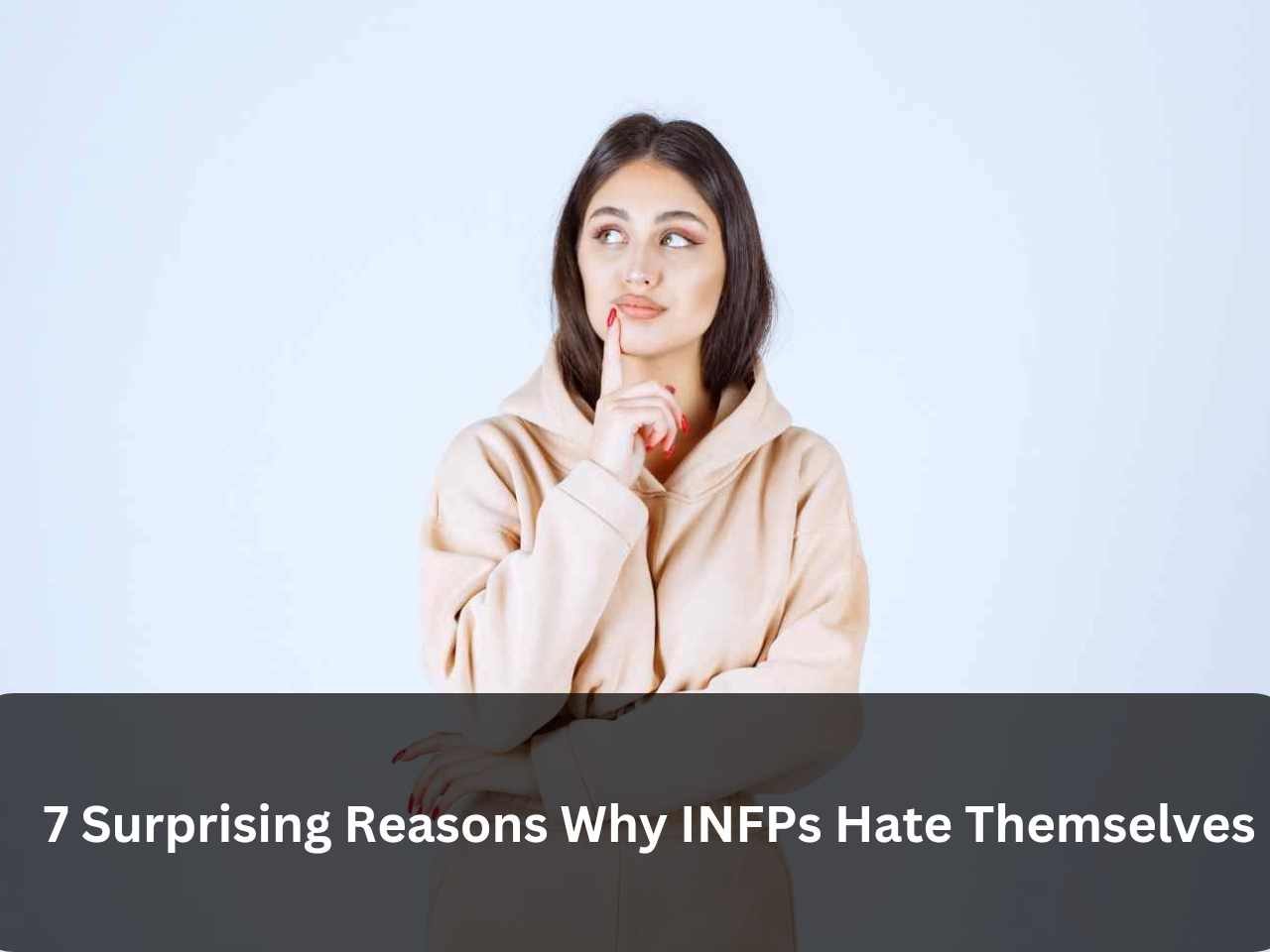Reading Time: 12 Minutes
Introduction: Why INFPs Struggle with Self-Hate
INFPs, or those with the Introverted, Intuitive, Feeling, and Perceiving personality type, are known for their deep emotions, rich inner worlds, and strong values. But with these strengths comes a downside—self-hate. So, why do INFPs hate themselves? It’s not because they’re naturally self-critical or inherently negative, but because their idealism and sensitivity often set them up for disappointment. They have a strong desire to live up to their own high standards, and when reality doesn’t match their ideals, they tend to turn their frustrations inward.
It’s like trying to live in a Pinterest-perfect world where everything is always just a little out of reach. This struggle often leads to self-criticism, and unfortunately, self-hate can sneak in. Understanding why this happens is the first step in breaking the cycle and finding peace within themselves.
The Root Causes: Why Do INFPs Develop Self-Hate?
1. The Burden of High Expectations
INFPs are notorious for setting sky-high expectations for themselves. They dream big, and that’s a beautiful thing, but it also means they can be their own worst critics. Picture an INFP deciding to write the next great novel. They imagine it winning awards, changing lives, and becoming a timeless classic. But when the first draft turns out to be, well, a first draft—full of typos, awkward sentences, and a plot that’s all over the place—they feel like they’ve failed.

Instead of seeing it as part of the process, they might spiral into thinking, “If it’s not perfect, it’s worthless.” This is where self-hate creeps in. They forget that perfection is an illusion and that even masterpieces start out messy.
2. Overthinking and Emotional Overwhelm
INFPs have a superpower: they can think and feel deeply about just about anything. The problem is, this superpower can sometimes backfire. They might replay a conversation in their head a hundred times, analyzing every word and gesture, wondering if they said the right thing, or if they hurt someone’s feelings.
This constant overthinking can lead to emotional overwhelm, where every little misstep feels like a catastrophe. They end up trapped in a loop of self-doubt, questioning their worth, and feeling like they’re always one step away from being a total failure. It’s like trying to navigate a maze that keeps changing every time you take a turn. Exhausting, right?
3. The Weight of Empathy: Internalizing Others’ Pain
INFPs are incredibly empathetic, which is wonderful for connecting with others but can be a heavy burden to carry. They don’t just understand other people’s feelings; they absorb them like a sponge. If a friend is upset, an INFP feels it deeply, sometimes even more intensely than the person actually going through the tough time. This ability to internalize others’ emotions can lead them to blame themselves for things that aren’t even their fault.
They might think, “If only I were better, stronger, or more supportive, maybe I could make everything okay.” Over time, this can snowball into a deep sense of guilt and self-blame, making them feel responsible for the world’s pain and, in turn, hating themselves for not being able to fix it all.
4. Feeling Misunderstood and Out of Place

INFPs often feel like they don’t quite fit in with the world around them. Their ideas and values are unique, and they cherish them deeply, but this can sometimes make them feel isolated. When they try to share their thoughts and others don’t “get it,” they can start to wonder if there’s something wrong with them. Imagine being at a party where everyone is talking about the latest trends, but you’re more interested in discussing the meaning of life.
You Might Like To Read: Why Are INFJs So Rare? ( 9 Interesting Facts About INFJs)
After a while, you might feel like you’re speaking a different language. This sense of being misunderstood can lead to loneliness and, eventually, self-hate. They might think, “Why can’t I just be like everyone else?” But in reality, their difference is their strength; it just doesn’t always feel that way.
The Psychology Behind Their Self-Hate: Why They Think the Way They Do
1. The Role of Introverted Feeling (Fi)
INFPs have a powerful internal compass called Introverted Feeling (Fi), which guides their values and sense of self. This Fi is like a moral GPS, always pointing them towards what feels right and true to them. The problem is, this compass is super sensitive. When INFPs believe they’ve strayed from their values, even a little, it triggers a loud inner alarm.
They might think, “I should’ve been more kind,” or “I didn’t stand up for what I believe in,” and this can lead to intense self-criticism. Fi makes them hold themselves to very high moral standards, and when they don’t meet these standards, they turn that disappointment inward, leading to self-hate. It’s like having a judge in your head who never takes a day off, and that judge is really strict.
You Might Like To Read: INFP Cognitive Functions (Fi, Ne, Si, Te): 4 Functions Explained in Very Simple Manner
2. The Influence of Intuition (Ne) on Self-Perception
INFPs’ Intuition (Ne) is like having a supercharged imagination. It’s constantly coming up with new ideas, seeing possibilities, and connecting dots that others might miss. But sometimes, Ne can go into overdrive, focusing too much on what could go wrong instead of what’s actually going well. INFPs might imagine all the ways they could fail, or they might compare themselves to some idealized version of who they think they should be.
This makes it easy for them to overlook their achievements and fixate on their perceived flaws. Ne can also make them feel like they’re always missing out on something better, which adds to their sense of dissatisfaction and self-criticism. It’s like having a mind that’s always looking at the grass on the other side of the fence, convinced it’s greener—even when it’s not.
3. The Effect of Perceiving (P) on Decision-Making and Self-Doubt
INFPs prefer to keep their options open, which is where their Perceiving (P) function comes in. They like to explore, take their time, and see where life takes them. But this laid-back approach can sometimes lead to indecision and self-doubt. They might spend hours (or days) agonizing over choices, worrying that they’ll pick the wrong path.
And when they finally make a decision, they often second-guess themselves, wondering if they should have chosen differently. This constant questioning can chip away at their self-confidence, making them feel like they’re never quite sure of anything. It’s like standing at a crossroads, not just wondering which road to take, but worrying that the road you pick might lead you straight off a cliff. The fear of making the wrong choice can paralyze them, fueling their self-hate.
How INFPs Can Overcome Self-Hate: Practical Tips and Strategies
1. Embrace Self-Compassion and Kindness
First things first: INFPs need to learn to be kind to themselves. Self-compassion is like giving yourself a warm hug on a bad day—it’s about treating yourself with the same understanding and care that you’d offer to a friend. Instead of beating themselves up over mistakes, INFPs should practice forgiving themselves. Everyone messes up sometimes, and that’s okay.
They can start by noticing when they’re being harsh with themselves and consciously switching to a more gentle tone. For example, instead of thinking, “I’m such a failure,” they might say, “I did my best, and that’s enough.” Over time, this shift in self-talk can help ease the grip of self-hate.
2. Set Realistic Expectations and Goals
INFPs often set the bar impossibly high for themselves, aiming for perfection in everything they do. But here’s the thing: perfection is a myth. It doesn’t exist, and chasing it will only lead to frustration and disappointment. Instead, INFPs should focus on setting realistic, achievable goals that align with their values.
They can start small—like setting a goal to write for 30 minutes a day instead of trying to complete a novel in a week. By breaking down big dreams into manageable steps, they can build confidence and feel a sense of accomplishment. Celebrating these small victories helps them see that progress, not perfection, is what really matters.
3. Build Supportive Relationships

No one should have to go through life alone, and this is especially true for INFPs. Building supportive relationships can make a world of difference in combating self-hate. INFPs should seek out friends and loved ones who understand and appreciate them for who they are.
You Might Like To Read: 4 INFP Zodiac Signs Explained: Explore Compatibility, Career Paths & Traits
These relationships offer a safe space to share their thoughts and feelings without fear of judgment. Having a strong support system also means they have people to remind them of their worth when they’re feeling down. Whether it’s through close friendships, a partner, or even therapy, these connections can help INFPs feel less alone in their struggles and more valued for their unique qualities.
4. Learn to Separate Self-Worth from External Validation
INFPs often tie their self-worth to how others perceive them. They might worry about what people think of them or feel crushed when they don’t receive the praise they hoped for. But relying on external validation is a surefire way to keep self-hate alive. Instead, INFPs need to cultivate a sense of self-worth that comes from within.
This means valuing themselves for who they are, not for what they achieve or how others see them. They can practice this by reflecting on their core values and what makes them unique, rather than seeking approval from outside sources. Over time, this internal validation can become a powerful tool in overcoming self-hate, helping them to stand strong in who they are, no matter what others think.
Conclusion: Embracing Who You Are, Flaws and All
So, why do INFPs hate themselves? It often comes down to their deep sensitivity, high expectations, and the way they overthink things. But the good news is, this self-hate isn’t permanent. By understanding the psychology behind it, INFPs can start to make changes.
Start by being kinder to yourself—remember, everyone makes mistakes, and that’s okay. Set goals that are realistic, not impossible. Surround yourself with people who love you just the way you are, and learn to value yourself from the inside out.
At the end of the day, being an INFP is pretty amazing. You have a big heart, a creative mind, and a unique perspective on life. Don’t let self-hate cloud that. Instead, focus on what makes you special, and give yourself the same love and understanding you so freely give to others. You deserve it.
Image Credit: Freepik